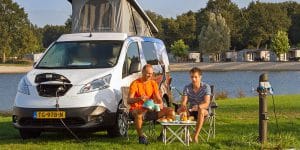Is your campsite ready for the electric car? Charging requires many changes to infrastructure
If Europe’s ambitions become a reality, in five years’ time there may well be millions of electric cars driving around on our continent. It remains to be seen if things will actually move quite that quickly, but you can be sure that electric cars will soon arrive at the gate of your campsite. Are you ready?
The first electric cars appeared about ten years ago, it was small and had no practical range. Until Tesla entered the market in 2012 with the Model S, the first EV (electric vehicle) with which you could drive 350 to 400 kilometres on a full battery. By now, Tesla has fierce competition, because almost every car manufacturer is bringing out an electric car this or next year. And the allelectric Jaguar I-Pace was declared Car of the Year in 2019..
40 pitches worth of power
Perhaps you have had a guest with a Tesla at your campsite in recent years and have been asked if you had a recharging point. Plugging an electric car directly into the campsite’s power supply is not really an option, because with a standard a 230 volt supply and a 6 or 10 ampere fuse, the usually at least 85 kilowatt battery would need almost 40 hours to be fully charged.
If you want to reduce the charging time to an acceptable one, you will need to offer at least a three-phase (400 volt) installation with 16 ampere fuses. With an installation like that, charging would take about ten hours. In that time, the electric car will have consumed as much electricity as 40 pitches on your campsite. And we’re only talking about fully charging one electric car. The chance that in five years’ time you will have many more campsite guests that drive an electric car is very high.
Linda Gedink, president of EFCO & HPA (the European umbrella organisation of national campsite federations), sees even more challenges for campsites. ‘You will not only have to think about how to offer your guests charging facilities, but also, for example, how much money to charge for the service. For example you could choose to ask different rates for different time slots, and make charging more expensive at the end of the day, when several guests come back from a day trip and all want to charge their cars.’
‘And then there’s the infrastructure on the campsite. A 3.6 kW connection charges slowly and is only suitable for overnight charging of an electric car with a small battery. 11 kW is the most commonly used, but requires three-phase power with a 16 ampere fuse and 22 kW requires double that capacity. Apart from the investment of 1000 to more than 3000 euros per charging point, the local electricity network must also have sufficient capacity. Another option is to create additional capacity through renewable energy from solar panels or a wind turbine.’
Solar panels create more capacity
The north Spanish campsite La Ballena Allegre in Sant Pere Pescador chose that last option. ‘We have created a new bungalow area where each bungalow is equipped with solar panels and a battery to store any unused solar power,’ says Managing Director Alex Trias. ‘The energy that is left from the day can be used at night, but each bungalow also receives a charger for an electric car to use the surplus electricity. The 39 bungalows are connected to each other, so that they can share the electricity with each other. This way we will always be able to charge electric cars with renewable power. For those who want to quickly recharge their electric car, we have a faster charging point at the campsite entrance.’
‘We came up with this solution because we were concerned about the volume of electricity we would have to provide if there were many electric cars on the campsite at the same time,’ Trias explains the choice for installing solar panels. ‘With our own panels we can offer this service without increasing the total external energy demand of the campsite, while there are also possibilities for those who want to charge faster immediately.’
Fast charging not an option
A real fast charging station like the ones on motorways doesn’t seem to be a real option for campsites. The Dutch company Fastned is specialized in the installation of fast charging points. When asked about costs they talk about amounts of approximately 80,000 euros per charging point for a 50 kW charger and almost double that for the newer 175 kW charger. ‘Apart from the fact that it is hard to recoup such an investment, a fast charging station requires a connection to the ‘medium voltage grid’ with voltages between 3 and 30 kiloVolt,’ says Fastned spokeswoman Kyra Hartlief.
